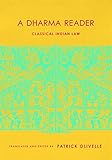A dharma reader : classical Indian law / Patrick Olivelle.
Material type: TextLanguage: English Original language: Sanskrit Series: Historical sourcebooks in classical Indian thoughtPublisher: New York : Columbia University Press, 2016Description: 1 online resourceContent type:
TextLanguage: English Original language: Sanskrit Series: Historical sourcebooks in classical Indian thoughtPublisher: New York : Columbia University Press, 2016Description: 1 online resourceContent type: - 9780231542159
- 0231542151
- 181/.4 23
- B132.D5
- online - EBSCO
| Item type | Current library | Call number | URL | Status | Notes | Barcode | |
|---|---|---|---|---|---|---|---|
 eBook
eBook
|
Biblioteca "Angelicum" Pont. Univ. S.Tommaso d'Aquino Nuvola online | online - EBSCO (Browse shelf(Opens below)) | Online access | Not for loan (Accesso limitato) | Accesso per gli utenti autorizzati / Access for authorized users | (ebsco)1821453 |
Includes bibliographical references and index.
Includes translations from Sanskrit.
Print version record and CIP data provided by publisher; resource not viewed.
Frontmatter -- Contents -- Preface -- Abbreviations -- Introduction -- Part I: Nature and Epistemology of Law -- 1. Early Thinkers -- 2. Later Aphoristic Texts on Dharma -- 3. Perspectives from Political Science: Kautilya (first-Second Century C.E.) -- 4. Innovations of Manu (Mid-Second Century C.E.) -- 5. Developments After Manu -- 6. The School of Vedic Exegesis -- 7. Early Commentators -- 8. Medieval Commentators and Systematizers -- Part II: Courts of Law and Legal Procedure -- 9. The Beginnings -- 10. The Early Theorists -- 11. The Mature Phase -- 12. Early Commentators -- 13. Medieval Commentators and Systematizers -- Notes -- Glossary -- Bibliography -- Index
Whether defined by family, lineage, caste, professional or religious association, village, or region, India's diverse groups did settle on a concept of law in classical times. How did they reach this consensus? Was it based on religious grounds or a transcendent source of knowledge? Did it depend on time and place? And what apparatus did communities develop to ensure justice was done, verdicts were fair, and the guilty were punished?Addressing these questions and more, A Dharma Reader traces the definition, epistemology, procedure, and process of Indian law from the third century B.C.E. to the middle ages. Its breadth captures the centuries-long struggle by Indian thinkers to theorize law in a multiethnic and pluralist society. The volume includes new and accessible translations of key texts, notes that explain the significance and chronology of selections, and a comprehensive introduction that summarizes the development of various disciplines in intellectual-historical terms. It reconstructs the principal disputes of a given discipline, which not only clarifies the arguments but also relays the dynamism of the fight. For those seeking a richer understanding of the political and intellectual origins of a major twenty-first-century power, along with unique insight into the legal interactions among its many groups, this book offers exceptional detail, historical precision, and expository illumination.


